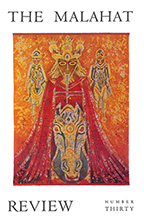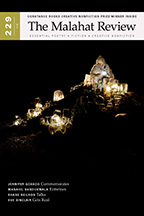Issues
Our Back Pages
Issue 30
Issue Date: April, 1974
Guest Editor: Robin Skelton
Pages: 144
Number of Contributors: 34
Buy Issue 30: Print Edition

In his opening comment, Robin Skelton laments what he sees as the proliferation of writers concerned more with “personal hang-ups” than with “the broad scope and nature of social responsibility, natural justice, and human compassion.” He yearns to revisit the engagé literature of the 1930s and, thus, encourages readers to seek out works by writers who convey “honesty of purpose, clarity of mind, and humanity of spirit.” This 1974 issue provides a wealth of opportunity to do just that.
The works of American poets Anthony Kerrigan, Richard O’Keefe, Leonard Nathan, Dale Nelson, and Roger Pfingston highlight the value of independent, vulnerable, and disciplined writing while exploring timeless and universal themes. They see the artist as having the potential to become both a great communicator and witness to history. Compelling insights also appear in the works of poets from England, China, and Iran. Themes surrounding family hierarchy, the status of women, and cultural assimilation find their way into the works of Massud Farzan, Patricia Traxler, and Stephen Shu-Ning Liu.
Lovers of drama will delight in Tony Connor’s “The Last of the Feinsteins,” and fans of the ancient art of batik will relish in a fusion of mythical images from Thetis Blacker’s visionary series “Apocalypse.”
Book reviews by Marilyn Bowering, Susan McCaslin, and Jill Pringle beautifully round out the issue by highlighting the painful process that people must endure en route to growth and enlightenment. The contributors in this issue passionately demonstrate howart can be the bridge. In the words of American poet Philip Appleman: “As pure as Italian melodrama: life follows art.”
—Robin Reniero









